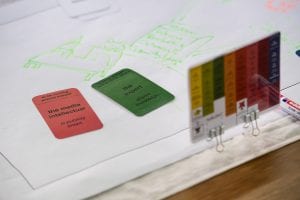A spoonful of sugar? What do Games for Health have to offer the field of Digital Behaviour Change?
By Artur Direito, on 13 December 2017
By Jim Lumsden, PhD candidate in the School of Experimental Psychology, University of Bristol

Photo credit: Games for Health Europe 2017
It’s summer at the university: the hustle and bustle of the students is gone, your colleagues flit in and out of the office on various holidays; but you’re there at your desk, desperately trying to finish another paper while you’ve got the peace and quiet. For many of us, the academic summer can be a motivational challenge which leaves you wondering why you’re in research after all. But thankfully for me, each autumn brings the Games for Health Europe conference. For the past three years I’ve headed to Holland, looking for an academic revitalisation, and each year I’ve received it.
Games for Health is, as the name suggests, a conference at the intersection between games design and health-behaviour change. I would say it feels quite small, but attendance is by no means limited, and is growing every year. Talks span a broad range of topics, from artfully-designed mobile-games aiming to teach homosexual men in Mexico City the positives of safe sex, all the way through to artificial intelligence analysing gameplay data from a virtual-reality supermarket, with the aim of diagnosing dementia. Games for Health is jam packed with eccentrics and enthusiasts of gaming and tech and healthcare, all keen to show the world the transformative power that games can have on health behaviour. This conference turns those five little rooms in Eindhoven into one of the most exciting, positive and motivational places you can imagine.

Photo credit: Games for Health 2017
Highlights from this year included: Tom Langhorst, a composer turned scientist, who presented on the use of ‘sonification’ to convey subtle meaning through music. He created a whimsical soundtrack to guide young children through the challenging process of being in an MR scanner. The music guided their actions, with riotous moments when the scanning procedure allowed for the child to move, quiet sections when they had to be as still as possible, and gradually ascending and descending texture and tonality to convey the optimal breathing pattern for the procedure. Elizabeth Edwards presented on a newly developed app, Cigbreak, designed to provide support with smoking cessation: acting both as a distraction from cravings and as a delivery tool for a whole suite of behaviour change techniques. And, I was intrigued by Lena Hendlmeier’s plans for a roleplaying-based card game, designed to put players in the shoes of various members of society, and help them to appreciate the impact that small interactions can have on the quality of their community. Finally, I listened with interest to Heather Honea as she told us about her studies on the effects of leaderboards and point-scoring, as part of two interventions aiming to modify behaviours around wellbeing and sustainability.
The eclectic and pioneering nature of Games for Health Europe never fails to re-inspire me. I have a lot of faith in the power of games to transform behaviour, but, as conference host John Harrison closed: the last few years have brought about a wealth of innovation and novel ideas, but the evidence base around games for behaviour change is still underdeveloped. We need to embrace the challenge of accumulating robust evidence that games can engage users for the long term, maintaining health behaviour change in realistic settings, and in an economically viable way. And with that said, Bring on Games for Health 2018!

Photo credit: Games for Health 2017
Questions to consider
- Do games have a role to play in the delivery of digital behaviour change interventions?
- Does the current lack of evidence that games can deliver effective interventions simply reflect the fact that serious games are a relatively new field, or is it a symptom of a deeper design problem?
Bio

Jim Lumsden
Jim Lumsden is a PhD Candidate currently studying at the University of Bristol under the auspices Professor Marcus Munafò and Natalia Lawrence. His research revolves around gamification and serious games, particularly in relation to the gamification of cognitive assessment and cognitive training. His current focus is on understanding the motivational and cognitive effects of different game mechanics as they are applied in a computerised test-setting.
Conflicts of Interest:
Jim Lumsden is a past and current co-author of Dr Elizabeth Edwards.
 Close
Close


